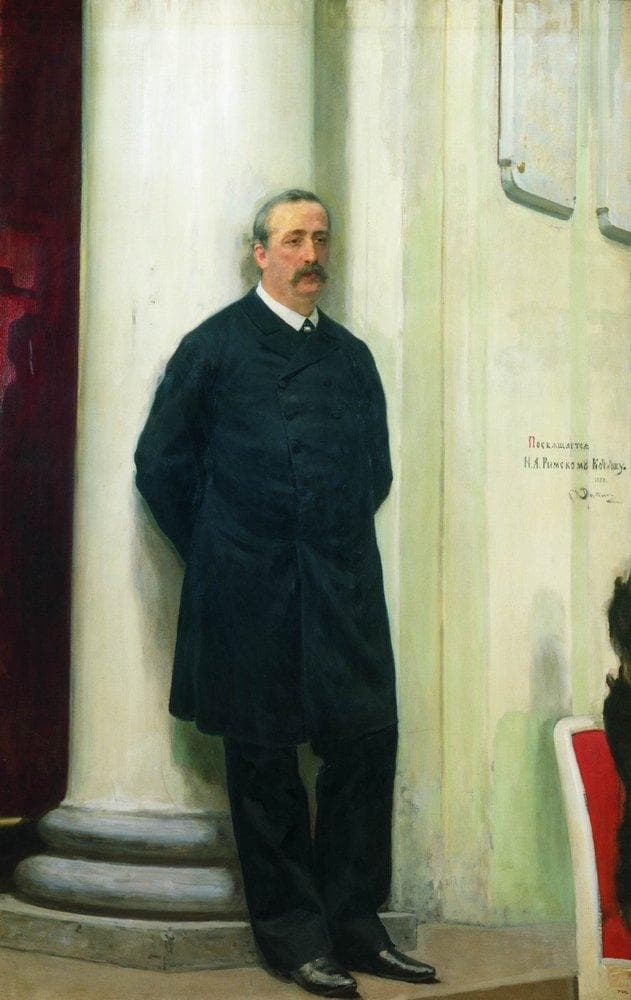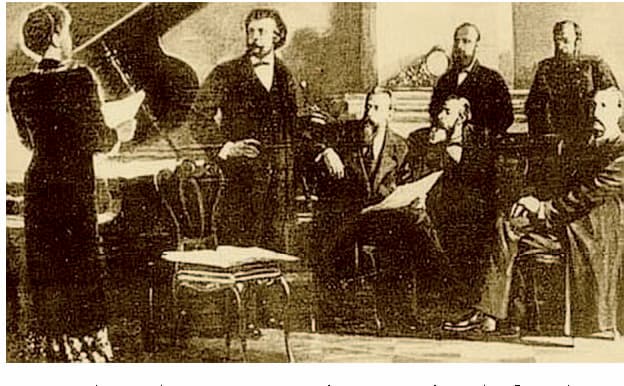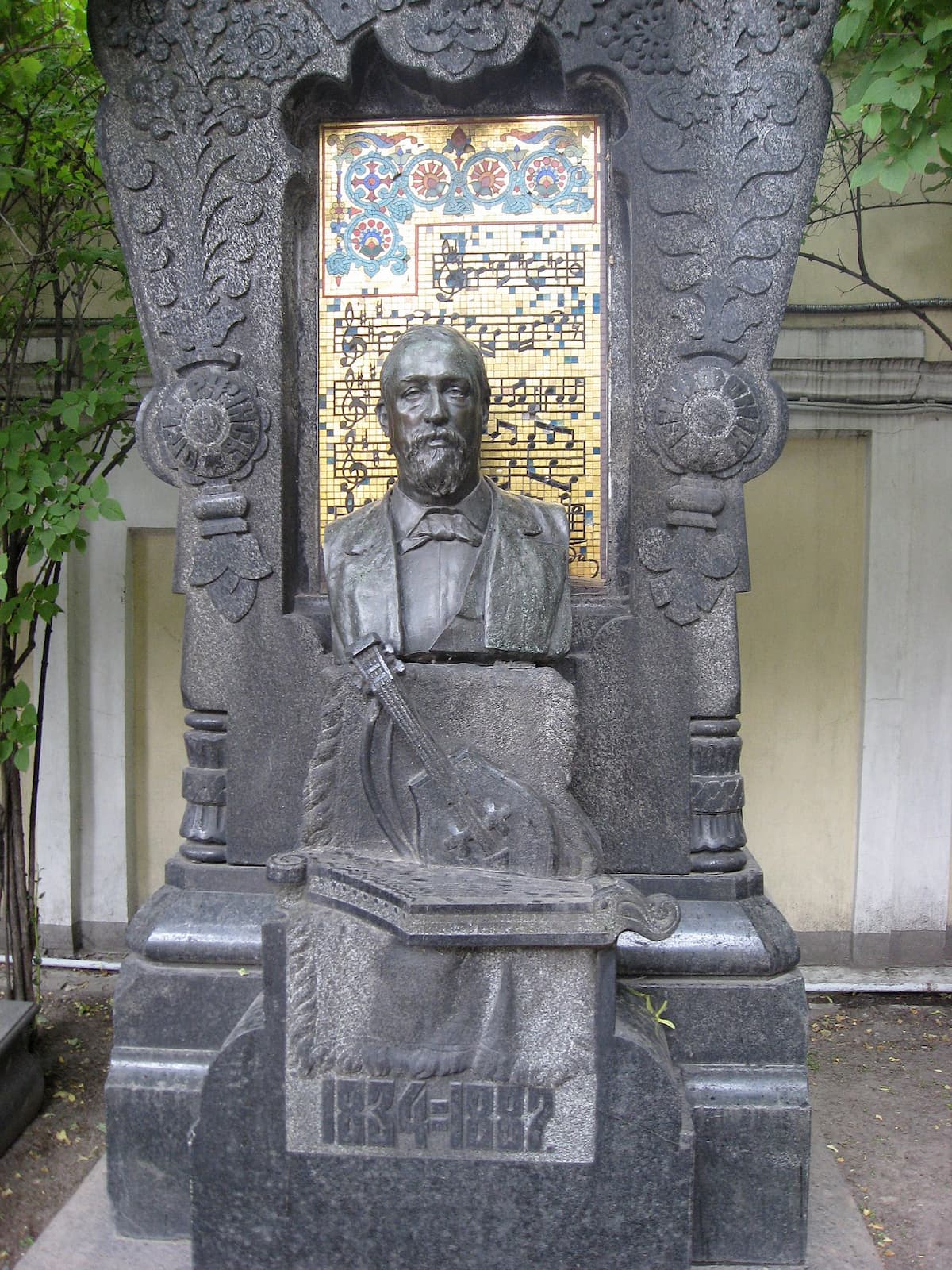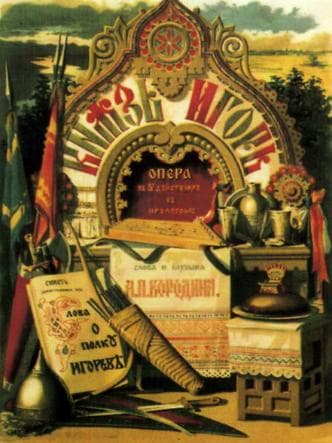Alexander Borodin (1833-1887) was a scientist and medical doctor who considered music his favourite hobby. Regardless, his compositions place him in the front rank of Russian composers, as his music had a strong lyric vein that reflects the character of Russian folk melodies. Borodin did suffer from poor health, as he overcame cholera and several minor heart failures.
Alexander Borodin: Symphony No. 3 in A minor, “Scherzo”
Stress at Work
During the 1880s Borodin found it increasingly difficult to find time for music. His wife’s health was rapidly declining, and his duties at the Medical-Surgical Academy seemed to always increase. He was forced to devote much time to committees, commissions, and lots of paperwork.

Repin: Portrait of Alexander Borodin
As he wrote to his wife, “God knows, I am expected to be Glinka and Semyon Petrovich, scientist and committee-man, artist, official, benefactor, father of adopted children, doctor and invalid, all rolled into one. But it won’t be long before I am nothing more than the last of these.” In addition, he became the victim of a gastroenteritis pandemic that was raging in Moscow, and he was forced to spend several days in bed.
Alexander Borodin: Petite Suite (Anatoly Sheludyakov, piano)
Death at the Ball

The Russian Five, with Borodin on the right
On the evening of 27 February 1887, according to the new calendar, Borodin was invited to a grand candlelight ball organised by the faculty of the Medical-Surgical Academy. Borodin was wearing Russian national dress, a dark-red woollen shirt, baggy blue trousers, and high boots. Everybody was in high spirits, and after completing a waltz with one of the ladies, Borodin started to feel unwell.
An eyewitness reports, “Borodin was speaking indistinctly as though his tongue had grown numb, and he seemed to be swaying. I shall never forget the look on his face; a helpless pitiful and frightened look. I hardly managed to cry ‘what’s the matter?’ before he collapsed onto the floor.” Every doctor and professor in the Academy was soon attending to the composer, and they tried for almost an hour to revive him. One doctor was in obvious despair, saying again and again that he would never forgive himself for not applying bleeding treatment from the start.
Alexander Borodin: More (The Sea) (Konstantin Pluzhnikov, tenor; Yuri Serov, piano)
Alexander Borodin: Spes’ (Pride) (Nikolai Okhotnikov, bass; Yuri Serov, piano)
Alexander Borodin: U lyudey-to v domu (At some Folks’ Houses) (Andrey Slavny, baritone; Yuri Serov, piano)
Post-mortem

Tomb of Alexander Borodin
The post-mortem examination was carried out in the very same room in which Borodin had died. The autopsy showed that the cause of death was a burst artery in the heart. Apparently, the artery wall had become so fragile that it could not support the blood pressure. During his fall, Borodin had also struck his temple against a sharp corner, causing a minor haemorrhage in the brain.
To professor Vinogradov, who was conducting the post-mortem examination, it was surprising that Borodin had lasted so long with his heart in such a terrible condition. “In circumstances such as these, death could have occurred at any minute.”
Alexander Borodin: String Quartet No. 2 in D major, “Allegro”
Funeral and Legacy

Alexander Borodin’s Prince Igor
A particularly large crowd gathered at Borodin’s funeral, as it was attended by people of all professions and walks of life. Everybody assembled at the graveside to pay their last respects, and a student choir sang at the funeral. Students from the Academy also bore his coffin all the way to the cemetery, adjoining the Alexander Nevsky Monastery. Borodin’s final resting place is next to the grave of Mussorgsky and not far from Dargomishky.
A memorial was erected above his grave, with a large part of the funds donated by Mitrofan Belyaev, the famed philanthropist and music publisher. Rimsky-Korsakov and Glazunov began to edit and publish the unfinished works Borodin had left behind, most notably Prince Igor and the A minor Symphony. By the spring of 1887, Glazunov had edited the two movements of this unfinished symphony, and written down the first movement from memory.
A trio was added to the Scherzo and was based, in accordance with the intentions of the late composer on the “Merchant’s Tale,” which he had earlier rejected from Prince Igor. As for the opera, the work was edited and finished by Rimsky-Korsakov and Glazunov, and the first performance was staged in 1890. As a scholar writes, “It is an extraordinary work created in nearly impossible conditions. Prince Igor clings to a place at the edge of the repertory owing to Borodin’s skill in realizing the ‘song and cantilena’ to which, by his own confession, he was drawn.”
For more of the best in classical music, sign up for our E-Newsletter
